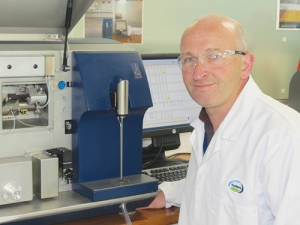Two new awards open to help young farmers progress to farm ownership
Entries have opened for two awards in the New Zealand Dairy Industry Awards (NZDIA) programme, aimed at helping young farmers progress to farm ownership.
 Dr Steve Holroyd is heading the team at Fonterra, which is doing leading edge research into milk ‘fingerprinting’.
Dr Steve Holroyd is heading the team at Fonterra, which is doing leading edge research into milk ‘fingerprinting’.
Fonterra scientists' discovery of a new way of extracting more valuable data from a simple milk test has paved the way for developing a new, high-value UHT milk product now being sold in China.
A breakthrough discovery by scientists at Fonterra's research and development centre in Palmerston North is seen as leading edge, and the work has entered the finals of the NZ Innovation Awards, the winners due to be announced this week.
The discovery is called 'milk finger-printing', implying that, like human fingerprints, each print is different and unique; so too is the milk produced by each of Fonterra's 10,000-plus suppliers.
Every time a tanker calls at a Fonterra shareholders' farm to pick up milk, a small sample is taken and sent in a cooled state to a laboratory near Hamilton. This has been done for years and is essentially a standard quality control measure. But another key function of the test is to analyse the milk for its protein and milksolids.
Dr Steve Holroyd, leading the enhanced 'fingerprinting' test, told Rural News the composition of the milk is analysed using a spectrometer, which shines light through the milk sample.
"When you shine light through milk some of the light is absorbed and depending on the different ratios of fat and protein that generates a spectrum akin to a fingerprint," Holroyd explains. "Each sample is a bit different; there are different levels of protein and the composition is unique to each farm. The spectrometer gives a precise measurement and does it quickly; each day the lab has to process thousands of samples."
Holroyd says the technology is not new and the testing equipment has been around for some time, used in other countries in varying degrees. But the Fonterra scientists have manipulated the software used for analysing the milk sample to produce new and valuable data which has played a part in developing a high quality UHT milk product.
"The additional thing we have done, as well as measuring the fat and protein, is to use that entire spectrum more effectively to mine a whole bunch of additional parameters about the quality of that milk out of that spectrum," Holroyd said.
"We analyse it statistically to gather a lot more information including a whole range of special proteins. The properties of these are more imperative as you get into the greater value add products."
It is Fonterra's ability to identify these special proteins, exploit extra data from existing testing and use it to assist with a high-quality UHT milk for the Chinese market that has put the co-op into the finals of the prestigious NZ Innovation Awards.
Holroyd says they use the software in new ways to get more data and derive greater value from the milk.
When a tanker calls at a farm, milk from this farm is normally mixed in with other milk from other farms and taken back to the processing plant. But, on the basis of the new testing that identifies farms producing the high quality milk for specific products, Fonterra has changed its tanker runs to target specific milk.
This additional mining of information, and the application of that data, has led to Fonterra's Waitoa plant in Waikato producing this special UHT milk for China. The unique milk is collected only from farms in this region.
This research was first designed to focus on food safety after the melamine incident that surfaced in China in October 2008, but this research was soon applied to other quality parameters. The project has been partly funded by the Government's PGP scheme and it will feature in a special PGP expo.
Holroyd and colleagues are now probing for other information using the fingerprinting technology. Unanswered questions remain, but if answered they could lead to new high value add products on supermarket shelves around the world.
Additional reductions to costs for forest owners in the Emissions Trading Scheme Registry (ETS) have been announced by the Government.
Animal welfare is of paramount importance to New Zealand's dairy industry, with consumers increasingly interested in how food is produced, not just the quality of the final product.
Agriculture and Forestry Minister Todd McClay is encouraging farmers and growers to stay up to date with weather warnings and seek support should they need it.
The closure of SH2 Waioweka Gorge could result in significant delays and additional costs for freight customers around the Upper North Island, says Transporting New Zealand.
OPINION: The year has started positively for New Zealand dairy farmers and things are likely to get better.
Ministry for Primary Industries (MPI) Director General Ray Smith believes there is potential for an increase in dairy farming in New Zealand.

OPINION: If the hand-wringing, cravat and bow-tie wearing commentariat of a left-leaning persuasion had any influence on global markets, we'd…
OPINION: With Winston Peters playing politics with the PM's Indian FTA, all eyes will be on Labour who have the…